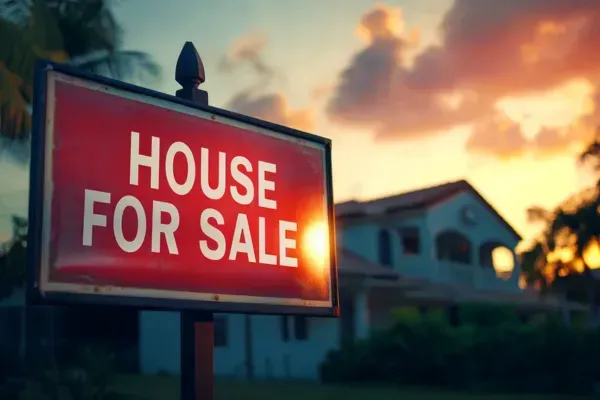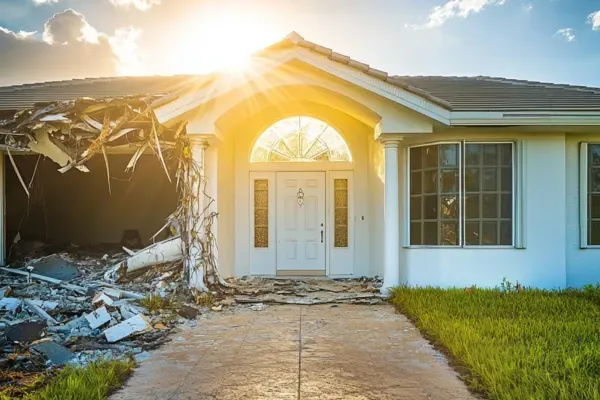
How Many Missed Payments Before Foreclosure
Last Updated: May 27, 2025
Article By: Kim M.
Facing the possibility of foreclosure can feel like a heavy weight on your shoulders, and understanding how many missed payments before foreclosure can occur is a critical first step in navigating this challenging situation. If you’re a homeowner in Florida, the fear of losing your home can be overwhelming, but knowledge is power, and we’re here to guide you with compassion and clarity. This article will walk you through the foreclosure process, explore alternatives, and provide actionable steps to help you regain control. With empathy for what you may be going through, we’ll break down the timeline, options, and solutions available to you, ensuring you feel supported and informed every step of the way.

Understanding Missed Payments and the Path to Foreclosure
When mortgage payments are missed, it’s natural to feel anxious about what comes next. In Florida, foreclosure typically begins after three to six missed payments, depending on your lender’s policies and the terms of your mortgage agreement. Most lenders initiate the foreclosure process after 120 days of delinquency, as outlined by federal guidelines from the Consumer Financial Protection Bureau (CFPB). However, some lenders may act sooner, especially if communication breaks down.
The process starts with a Notice of Default, which is a formal letter from your lender indicating you’re behind on payments. This notice typically arrives after 90 days of missed payments. From there, you may have 30 to 90 days to resolve the delinquency before the lender files a foreclosure lawsuit. The exact timeline varies, but understanding this progression is key to taking proactive steps.
At Florida Offer, we’ve spent years helping homeowners in Tampa, Sarasota, and St. Petersburg navigate the complexities of foreclosure. Our team of real estate experts specializes in finding home seller solutions tailored to your unique situation, whether it’s negotiating with lenders or exploring alternatives like a short sale. We know how stressful this time can be, and our mission is to provide you with clear, actionable advice delivered with care. With our deep knowledge of Florida’s real estate market and foreclosure laws, we’re here to guide you toward a path that feels right for you.
The sooner you reach out to your lender or a real estate professional, the more solutions you’ll have. Contacting your lender after just one missed payment can open the door to repayment plans or forbearance, potentially stopping foreclosure before it starts.
The Foreclosure Process in Florida: What to Expect
The foreclosure process steps Florida homeowners face follow a judicial foreclosure system, meaning the lender must go through the courts to repossess your home. This process can take anywhere from six months to a year, depending on the circumstances. Below, we outline the key stages to help you understand what lies ahead:
- Missed Payments (1-2 Months): After one or two missed payments, your lender may send late payment notices or attempt to contact you. At this stage, you may still have options to catch up through a repayment plan.
- Notice of Default (3-4 Months): After about 90 days of delinquency, you’ll receive a Notice of Default. This is a formal warning that foreclosure proceedings may begin if the issue isn’t resolved.
- Foreclosure Lawsuit Filed (4-6 Months): If payments remain unpaid, the lender files a foreclosure lawsuit in court. You’ll receive a summons and have 20 days to respond.
Continued Below
- Court Proceedings (6-12 Months): The court reviews the case, and if no resolution is reached, a foreclosure sale date is set. You may still have time to explore alternatives during this period.
- Foreclosure Sale: If the process reaches this stage, your home is auctioned to the highest bidder, typically the lender. After the sale, you may need to vacate the property.
This timeline can feel daunting, but there are stop foreclosure alternatives Florida homeowners can pursue at every stage. From loan modifications to selling your home, you have options, and we’ll explore them further below.

How Foreclosure and Short Sales Impact Your Credit
One of the most pressing concerns for homeowners facing financial hardship is how foreclosure affects credit score Florida residents rely on for future opportunities. A foreclosure can significantly damage your credit, lowering your score by 100-160 points or more, according to data from FICO. The impact can linger on your credit report for up to seven years, making it harder to secure loans, rent, or even employment.
In contrast, a short sale vs foreclosure credit impact is generally less severe. A short sale—where you sell your home for less than the mortgage balance with lender approval—may reduce your credit score by 50-100 points, depending on your payment history and the lender’s reporting. While both options affect your credit, a short sale often allows for a faster recovery, as it demonstrates an effort to resolve the debt responsibly.
For example, let’s say you’re a homeowner in Tampa struggling to keep up with payments. Opting for a short sale could allow you to sell your house fast and avoid the deeper financial scars of foreclosure. At Florida Offer, we’ve helped countless homeowners navigate these decisions, ensuring they understand the long-term implications and feel empowered to choose the best path.
Exploring the Short Sale Option in Florida
A short sale can be a lifeline for homeowners looking to avoid foreclosure, but understanding the short sale process timeline Florida is essential for planning. A short sale involves selling your home for less than what you owe, with your lender’s approval. Here’s a breakdown of the process:
- Assess Eligibility: To qualify for a short sale eligibility Florida, you must demonstrate financial hardship (e.g., job loss, medical expenses) and prove your home’s value is less than the mortgage balance.
- Hire a Real Estate Professional: Working with an experienced agent or a company that buys houses can streamline the process. They’ll help gather documentation and negotiate with your lender.
- Submit a Short Sale Package: This includes a hardship letter, financial statements, and a purchase offer from a cash buyer for homes.
- Lender Review (1-3 Months): The lender evaluates the package and may request additional documents. Approval can take time, but patience is key.
- Close the Sale: Once approved, the sale proceeds, and the lender forgives the remaining mortgage balance.
The benefits of short sale over foreclosure are significant. Not only does a short sale lessen the credit impact, but it also allows you to avoid the public record of a foreclosure, which can feel less stigmatizing. Additionally, you may be eligible to purchase another home sooner—sometimes within two years—compared to five to seven years after a foreclosure.
To speed up the short sale process, compile your financial records, including bank statements, pay stubs, and tax returns, before submitting your short sale package. This can reduce delays and show your lender you’re serious about resolving the situation.
Alternatives to Foreclosure: Empowering Solutions
If you’re wondering about stop foreclosure alternatives Florida homeowners can pursue, rest assured there are multiple paths to explore. Taking action early can make all the difference, and we’re here to help you feel confident in your choices. Here are some viable options:
- Loan Modification: Work with your lender to adjust your mortgage terms, such as lowering the interest rate or extending the loan term, to make payments more affordable.
- Repayment Plan: If your financial hardship is temporary, your lender may allow you to spread missed payments over time while resuming regular payments.
- Forbearance: Temporarily pause or reduce payments during a hardship, with the agreement to repay the deferred amount later.
- Deed in Lieu of Foreclosure: Voluntarily transfer your home’s deed to the lender to avoid foreclosure proceedings.
- Sell Your Home: If you have equity or can sell your home for cash, selling quickly to a cash buyer for homes can help you pay off the mortgage and avoid foreclosure altogether.
For homeowners in Sarasota or St. Petersburg, selling your home in default can be a practical solution. Companies like Florida Offer specialize in we buy houses scenarios, offering fast, hassle-free sales to homeowners in distress. Our process is designed to be transparent and supportive, ensuring you feel heard and respected throughout.
Your Rights as a Florida Homeowner
Understanding your Florida homeowner foreclosure rights is crucial to protecting yourself during this process. Florida law provides several safeguards to ensure you’re treated fairly:
- Right to Reinstatement: You can stop foreclosure by paying all missed payments, fees, and costs before the foreclosure sale.
- Right to Mediation: Some counties offer foreclosure mediation programs to help you negotiate with your lender.
- Right to Notice: Lenders must provide proper notification at each stage, giving you time to respond or seek alternatives.
- Right to Redeem: In rare cases, you may have a brief period after the foreclosure sale to reclaim your home by paying the full mortgage balance.
Knowing your rights can feel empowering, especially when the process seems overwhelming. If you’re unsure where to start, reaching out to a real estate professional or legal advisor can provide clarity. At Florida Offer, we’re committed to helping homeowners understand their options and feel supported every step of the way.
Why Avoiding Foreclosure Matters
The reasons to avoid foreclosure Florida homeowners should consider go beyond financial implications. Foreclosure can take an emotional toll, disrupt your family’s stability, and limit future housing opportunities. By exploring alternatives like a short sale or selling your home in default, you can:
- Protect Your Credit: Minimize the long-term impact on your financial future.
- Maintain Dignity: Avoid the public nature of a foreclosure auction.
- Move Forward Faster: Resolve the situation and start rebuilding sooner.
For example, a homeowner in Tampa facing foreclosure might choose to sell my house for fast cash to a company like Florida Offer. This allows them to settle their mortgage debt, avoid foreclosure, and transition to a fresh start with less stress. We understand how difficult this decision can be, and our team is here to guide you with compassion and expertise.
Taking the Next Step with Confidence
If you’re facing the uncertainty of how many missed payments before foreclosure, know that you’re not alone, and there are solutions within reach. Whether you’re considering a short sale, exploring loan modifications, or looking to sell your home in default Florida, taking action early is the key to protecting your future. At Florida Offer, we’ve helped homeowners across Tampa, Sarasota, and St. Petersburg find paths forward that feel right for them. Our team is ready to listen, answer your questions, and provide the support you need during this challenging time.
Reach out today to explore your options, whether it’s a cash offer on house or guidance on navigating the foreclosure process. We’re here to help you move forward with confidence and peace of mind, knowing you’ve made an informed decision for yourself and your family.
This article is based on expert real estate experience and aims to provide helpful guidance for homeowners facing foreclosure. For personalized financial or legal advice, we recommend consulting with licensed professionals, such as a CPA, attorney, or government official, to ensure your decisions align with your unique circumstances.
We Offer a Free Consultation. Find Answers Faster & Easier!
More Topics for You:
Home Sellers Resources:
© 2026 Florida Offer. All rights reserved.






